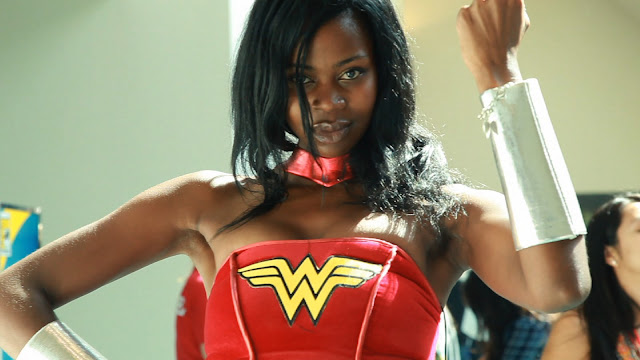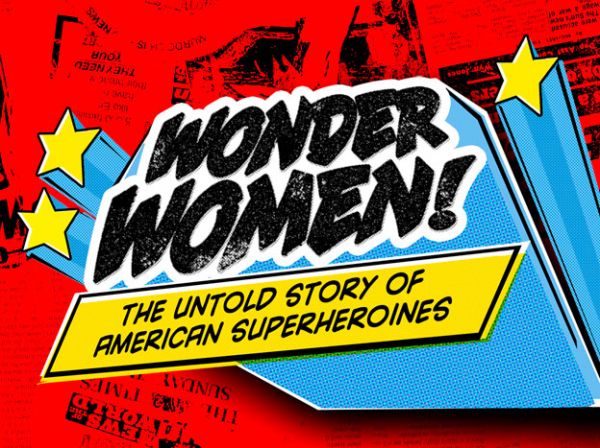 |
| Wonder Women movie poster |
Written by Amanda Rodriguez
Wonder Women: The Untold Story of American Superheroines is a documentary by Kristy Guevara-Flanagan available for free streaming on PBS (I heart free stuff). The film shows us Wonder Woman from her inception as a feminist character designed by her creator William Moulton Marston to usher in a matriarchal era to her loss of powers after World War II when women were pushed to leave the work force and go back to their homes, and finally, to the legacy of superheroines who would not have existed without her. In just shy of an hour, we get a comprehensive history and learn what makes Wonder Woman and other superheroines so important for women and girls.
Wonder Woman spent many post-World War II years sans powers as a non-feminist character and her many years after continued to render her as a dubious feminist role model. Kathleen Hanna of the feminist punk band Bikini Kill is interviewed in the film, and she says, “There’s, like, so few images of powerful women that women get desperate…we’ll just take any kind of garbage or crumb off the table that we can find and claim that as powerful, even when it’s kinda not.” I agree in many cases with Hanna, especially concerning the pornulated female figures of film and TV whose abilities are confined to that which is sexy and that which pleases men, and though Wonder Woman is often given those qualities to keep her shallow and without a greater political or social relevance, the idea of Wonder Woman has taken root in the collective female psyche as a symbol of strength, independence, and equality. I find it the most fascinating and the most compelling that different iterations of Wonder Woman have ceased to affect her image. Women can be empowered by taking Wonder Woman and personally interpreting her into whatever kind of role model they choose because she is so iconic, regardless of any specific representations throughout her long history.
 |
| The feminism of Wonder Woman cosplay is up for debate, but the dedication to superheroines is all radness. |
It is perhaps because of Wonder Woman and her endless interpretability that we have more contemporary superheroines/powerful female figures like Xena Warrior Princess, Buffy the Vampire Slayer, and even Thelma and Louise or the women of the Deadly Viper Assassination Squad of Kill Bill. Like Hanna says, sometimes these heroines are not imbued with the most feminist qualities, but their success is a testament to that hunger for strong female representations.
Why are women and girls so hungry for kickass superheroines in the media? Lindsay Wagner, star of the hit 70’s series, The Bionic Woman recounts feedback from a fan who’d grown up with the show, “‘My dad wanted me to go to beauty school, but…I’m an engineer at NASA…because your character showed me that I could be something far beyond what we were ordinarily on track to be.'” These independent, smart, capable, and confident characters do show the women watching them that they, too, can be all those things. I won’t get into it too much here, but the documentary Miss Representation is extremely informative (and a bit depressing) as it details the shocking dearth of female stories portrayed in our popular culture…nevermind stories about strong women. How can women aspire and achieve if there are no examples of other women overcoming similar or even bigger challenges?
 |
| Carmela Lane draws inspiration from Wonder Woman to meet daily challenges & to give her daughter more opportunities than she had. |
Gloria Steinem views superheroines in our culture as critical:
“Girls actually need superheroes much more than boys when you come right down to it because 90% of violence in the world is against females. Certainly women need protectors even more, and what’s revolutionary, of course, is to have a female protector not a male protector.”
Think about it: if women can get where they are today, replete with all of our struggles, resistance, strength, and resilience, spurred on by such a paltry offering of role models, imagine what we could achieve if we had a truly diverse base of powerful, intelligent, resourceful superheroines to inspire us to unfathomable heights.
 |
| Katie Pineda: Wonder Woman enthusiast with the mantra: “Keep going; keep going; you’re going to be more.” |

Little known fact: Samuel R. Delany (seminal SF author and Brudner and Lamda awards recipient) penned several issues of the Wonder Woman comic, then got fired by Gloria Steinem (!) for engaging with contemporary social issues.
http://boingboing.net/2012/12/27/when-gloria-steinem-and-samuel.html